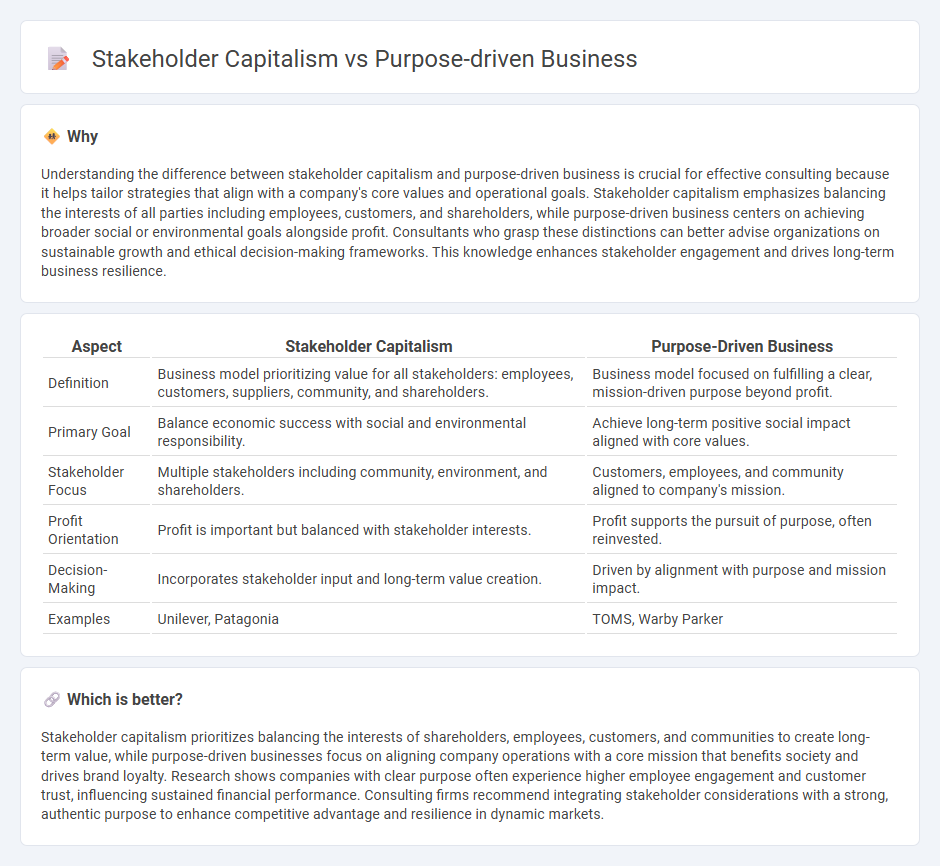
Stakeholder capitalism emphasizes balancing the interests of all parties involved in a business, including employees, customers, suppliers, and communities, to drive sustainable value. Purpose-driven businesses focus on integrating social and environmental missions into their core strategies to create positive impact beyond profit. Discover how consulting expertise bridges these models to enhance organizational success and responsibility.
Why it is important
Understanding the difference between stakeholder capitalism and purpose-driven business is crucial for effective consulting because it helps tailor strategies that align with a company's core values and operational goals. Stakeholder capitalism emphasizes balancing the interests of all parties including employees, customers, and shareholders, while purpose-driven business centers on achieving broader social or environmental goals alongside profit. Consultants who grasp these distinctions can better advise organizations on sustainable growth and ethical decision-making frameworks. This knowledge enhances stakeholder engagement and drives long-term business resilience.
Comparison Table
| Aspect | Stakeholder Capitalism | Purpose-Driven Business |
|---|---|---|
| Definition | Business model prioritizing value for all stakeholders: employees, customers, suppliers, community, and shareholders. | Business model focused on fulfilling a clear, mission-driven purpose beyond profit. |
| Primary Goal | Balance economic success with social and environmental responsibility. | Achieve long-term positive social impact aligned with core values. |
| Stakeholder Focus | Multiple stakeholders including community, environment, and shareholders. | Customers, employees, and community aligned to company's mission. |
| Profit Orientation | Profit is important but balanced with stakeholder interests. | Profit supports the pursuit of purpose, often reinvested. |
| Decision-Making | Incorporates stakeholder input and long-term value creation. | Driven by alignment with purpose and mission impact. |
| Examples | Unilever, Patagonia | TOMS, Warby Parker |
Which is better?
Stakeholder capitalism prioritizes balancing the interests of shareholders, employees, customers, and communities to create long-term value, while purpose-driven businesses focus on aligning company operations with a core mission that benefits society and drives brand loyalty. Research shows companies with clear purpose often experience higher employee engagement and customer trust, influencing sustained financial performance. Consulting firms recommend integrating stakeholder considerations with a strong, authentic purpose to enhance competitive advantage and resilience in dynamic markets.
Connection
Stakeholder capitalism prioritizes the interests of all stakeholders, including employees, customers, suppliers, and communities, aligning closely with purpose-driven businesses that emphasize social and environmental goals alongside profit. Consulting firms help organizations integrate stakeholder capitalism principles by redesigning business models to create shared value and measurable impact. This alignment fosters long-term sustainability, enhanced brand reputation, and stronger stakeholder trust.
Key Terms
Social Impact
Purpose-driven business centers on aligning company mission with social value creation, prioritizing ethical practices and community well-being. Stakeholder capitalism emphasizes balancing interests of all stakeholders, including employees, customers, suppliers, and society, to drive sustainable growth and accountability. Discover how these models reshape corporate responsibility and drive meaningful social impact.
Value Creation
Purpose-driven business emphasizes aligning company goals with social and environmental impact, creating value beyond profits by addressing stakeholder needs holistically. Stakeholder capitalism prioritizes balancing interests of shareholders, employees, customers, and communities to drive sustainable economic growth and long-term value creation. Explore deeper insights on how these models reshape corporate strategies and influence global market dynamics.
Inclusive Governance
Purpose-driven businesses prioritize long-term social and environmental goals aligned with their mission, integrating inclusive governance to ensure diverse stakeholder voices influence decisions. Stakeholder capitalism emphasizes balancing interests of shareholders, employees, customers, suppliers, and communities, fostering accountability through broad representation in governance structures. Explore how inclusive governance frameworks drive sustainable impact by aligning stakeholder engagement with corporate purpose.
Source and External Links
What Does a Purpose-Driven Company Do? (With Definition) - A purpose-driven business has a clear purpose guiding its strategy and decisions, focusing beyond profits to sustainability, social responsibility, employee well-being, and community impact.
What Is a Purpose-Driven Firm? - Purpose-driven companies aim to effect change by pioneering new business models, improving technologies, shifting consumer perceptions, paying employees fairly, and persuading investors to support sustainable practices.
How to create and maintain a purpose-driven business - Such businesses define their positive societal impact and core values, aligning them with strategies and operations to inspire employees and build customer trust and loyalty.
 dowidth.com
dowidth.com